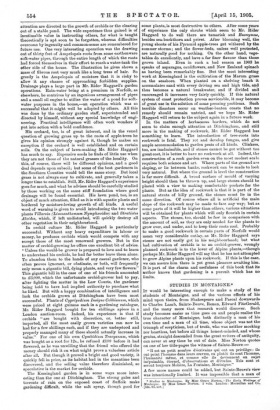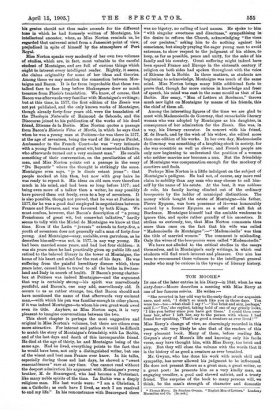IT would be interesting enough to make a study of
the students of Montaigne, and of the various effects of his mind upon theirs, from Shakespeare and Pascal downwards to Charles Lamb, Sainte-Beuve, Renan, Edward Fitzgerald, and the many more that research would discover. Such study becomes easier as time goes on and people realise the true character of Montaigne, both distinctly a man of his own time and a man of all time, whose object was not the triumph of scepticism, but of truth, who was neither mocking nor heartless, but before all things honest-minded, and whose genius, straight descended from the great writers of antiquity, can never at any time be out of date. Miss Norton quotes on one of her title-pages the witness of Sainte-Beuve
"II est un petit nombre d'eorivains qui ont un privilege : ils out peint rhomme dans hairs muvrea, on pluton ils soot l'homme, rhumanite mime, et comma ale ils deviennent nn snjet inepnisable, eternal, d'observations et d'etudes. Tela sont et seront toujoura Moller% La Fontaine, Montaigne."
A few more names could be added, but Sainte-Beuve's view was intentionally limited. It was impossible that a man of
• Studies in Montaigne. By Miss Grace Norton. —The Early Writings of Montaigne. By Miss Grace Norton. 2 vols. London : Macmillan and Co. [128. 6d. net.]
his genius should not thus make amends for the different tone in which he had formerly written of Montaigne, his intellectual ancestor, when, as Miss Norton reminds us, he regarded that universal mind from a Jansenist point of view, prejudiced in spite of himself by the atmosphere of Port RoyaL
Miss Norton speaks very modestly of her own two volumes of studies, which are, in fact, most valuable to the careful student of Montaigne, and are full of curious things which ought to interest every intelligent reader. Rightly, it seems, she claims originality for some of her ideas and theories. Among these we may mention the connection between Mon- taigne and Bacon. It is far from improbable that these two talked face to face long before Shakespeare drew so much treasure from Florio's translation. We know, of course, that Bacon was afterwards very familiar with Montaigne's writings ; but at this time, in 1577, the first edition of the Essais was not yet published, and the only known works of Montaigne, though already forty-four years old, were the translation of the Theologia Naturalis of Raimond de Sebonde, and the Discourse joined to his publication of the works of his dead friend, Etienne de la Boetie. Miss Norton quotes a passage from Bacon's Historia Vitae of Mortis, in which he says that when he was a young man at Poitiers—he was there in 1577, at the age of seventeen, being the ward of Sir Amyas Paula, Ambassador to the French Court—he was " very intimate with a young Frenchman of great wit, but somewhat talkative, who afterwards turned out a very eminent man." He recalls something of their conversation, on the peculiarities of old men, and Miss Norton points out a passage in the essay "Du Repentir " where the thought is strikingly the same. Montaigne even says, " je Is disois estant jeune " : that people mocked at him then, but now with grey hairs he was ready to repeat it. His ideas on old men were therefore much in his mind, and had been so long before 1577; and being even more of a talker than a writer, he may possibly have poured them out freely, even to a boy of seventeen. It is also possible, though not proved, that he was at Poitiers in 1577, for he was a good deal employed in negotiations between France and Navarre, and was favoured by both Kings. We must confess, however, that Bacon's description of " a young Frenchman of great wit, but somewhat talkative," hardly seems to tally with the Michel de Montaigne we know at that time. Even if the Latin " juvenis" extends to forty-five, a youth of seventeen does not generally call a man of forty-four young. And Montaigne—easy, sociable, even garrulous, as he describes him self—was not, in 1577, in any way young. He had been married some years, and had lost four children : it was six years since he had practically given up public life and retired to the beloved library in the tower at Montaigne, the home of his heart and mind for the rest of his days. He was suffering from the painful hereditary disease which, three years later, caused him to travel to all the baths in Switzer- land and Italy in search of health. If Bacon's young chatter- box at Poitiers was indeed Montaigne—and the argument that way is certainly strong—his spirit was marvellously youthful, and Bacon's, one may add, marvellously. old. It occurs to us as rather strange, too, that Bacon should not have mentioned the name of that afterwards very eminent man,—with which his pen was familiar enough in other places, if it was indeed Montaigne—to whom his own great work owed even its title. Anyhow, as Miss Norton says, it is very pleasant to imagine conversations between the two.
This short chapter is perhaps the most suggestive and original in Miss Norton's volumes, but there are others even more attractive. For interest and pathos it would be difficult to match the story of Montaigne's friendship with La Boetie, and of the last days and death of this incomparable friend. He died at the age of thirty, he and Montaigne being of the same age. Had he lived, everything points to the fact that he would have been, not only a distinguished writer, but one of the wisest and best men France ever knew. In his talks, especially during those sad last days, he showed a " sweet reasonableness " rare at any time. One cannot read without the deepest admiration his argument with Montaigne's young brother, M. de Beauregard, who had become a Protestant, like many noble spirits of the time. La Boetie was a deeply religious man. His last words were : " I am a Christian, I am a Catholic; as such have I lived, as such I am resolved to end my life." In his remonstrance with Beauregard there
was no bigotry, no calling of hard names. He spoke to him " with singular sweetness and directness," sympathising in the desire to reform the Church, acknowledging "the vices of our prelates," asking him to do nothing against his conscience, but simply praying the eager young man to avoid extremes, to show respect to the judgment of his elders, to keep, as far as possible, peace and unity, for the sake of his family and his country. Great suffering might indeed have been spared France and Europe in the sixteenth century if religion on both sides had spoken throughout with the voice of Etienne de in Boetie. In these matters, as students are beginning to acknowledge, Montaigne was much of the same mind. Miss Norton brings many little additional facts to prove that, though far more curious in knowledge and freer of speech, his mind was cast in the same mould as that of La Boetie. Her essay, " Men of Letters at Bordeaux," throws much new light on Montaigne by means of his friends, this the chief of them all.
Among the interesting figures of the time we are glad to meet with Mademoiselle de Gournay, that remarkable literary woman who was adopted by Montaigne as his daughter, in consequence of her admiration for the Essais. She was, in a way, his literary executor. In concert with his friend, M. de Brach, and by the wish of his widow, she edited more than one edition of his works. In her own day, Mademoiselle de Gournay was something of a laughing-stock in society, for she was eccentric as well as clever, and French people are only now beginning to understand the position of a woman who neither marries nor becomes a nun. But the friendship of Montaigne was compensation enough for the mockery of courtiers and fools.
Perhaps Miss Norton is a little indulgent on the subject of Montaigne's pedigree. He had not, of course, any more real claim to nobility than any man who may choose to call him- self by the name of his estate. At the best, it was noblesse de robe, his family having climbed out of the ordinary bourgeoisie by the ladder of municipal distinctions. The money which bought the estate of Montaigne—his father, Pierre Eyquem, was born possessor of it—was honourably earned by a former Eyquem as a seller of salt fish at Bordeaux. Montaigne himself had the amiable weakness to ignore this, and spoke rather grandly of his ancestors. It strikes us curiously, too, that Miss Norton comments thus more than once on the fact that his wife was called " Mademoiselle de Montaigne ":—" ' Mademoiselle' was then the title of married women." The comment is misleading. Only the wives of the bourgeoisie were called " Mademoiselle."
We have not alluded to the critical studies in the essays themselves, and in Montaigne's early writings, in which real students will find much interest and pleasure. Our aim has been to recommend these volumes to the intelligent general reader who may be curious in the byways of literary history.











































 Previous page
Previous page